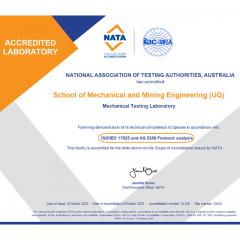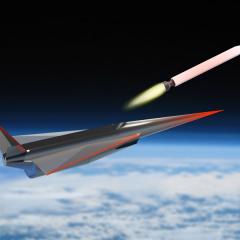The University of Queensland’s Centre for Hypersonics is offering new aerospace research projects ranging from the development of plasma fuel engines to the exploration of giant planet entry conditions.
These exciting new projects are now offering PhD opportunities for aspiring students to join in the pursuit of ground-breaking knowledge in this field.
AVAILABLE PROJECTS
Expanding the scramjet operating envelope through oxygen enrichment
This project aims to enhance the performance and flexibility of hypersonic air-breathing engines designed for reliable and economical access to space system. The outcomes of this project are expected to result in a validated understanding of how oxygen enrichment can augment scramjet thrust at high altitudes and speeds, and a performance evaluation of a launch system optimised for this approach. This could provide significant benefits to the performance of reusable, air-breathing launch technology.
PhD topics available:
- Predict and understand how oxygen enrichment can expand the scramjet operating envelope to low dynamic pressures and augment thrust at high Mach numbers using numerical simulations
- Experimentally explore oxygen scramjet enriched performance and map engine performance
- Conduct vehicle design studies to evaluate the system-wide benefits of oxygen enrichment
Contact: v.wheatley@uq.edu.au or anandv@uq.edu.au
Wind tunnel testing of a hypersonic plasma engine
This project aims to investigate the performance of Plasma Fuel Engines (PFEs) - air-breathing hypersonic propulsion systems that utilize electromagnetic acceleration of a plasma to generate thrust. This approach could eliminate the physical limitations of current engines such as scramjets and enable flight within the atmosphere at speeds greater than 10,000 kilometers per hour. The outcomes of this project are expected to be new technology that could revolutionize air-breathing hypersonic propulsion.
PhD topics available:
- Experimental Investigation of Plasma Fuel Engine Performance
- Advanced Diagnostics for Plasma Fuel Engine Ground Testing
- Multi-Fluid Computational Investigation of Plasma Fuel Engines
Contact: v.wheatley@uq.edu.au
Advanced Combustion Modelling for Scramjets and Rotating Detonation Engines
This project aims to develop new fundamental knowledge and engineering models underpinning air-breathing high-speed propulsion engines employing complex hydrocarbon fuels. The outcomes of this project are expected to be knowledge and tools needed to develop practical and effective supersonic propulsion engines for access to space, defence, and high-speed point-to-point flight.
PhD topics available:
- Large-Eddy Simulation of scramjet combustor experiments with Multiple Mapping Condition and Conditional Moment Closure models for highly compressible combustion
Contact: v.wheatley@uq.edu.au or a.klimenko@uq.edu.au
Investigation of the shock layer environment experienced during giant planet entry
This project aims to examine the non-equilibrium behaviour that occurs between the shock and the body of an entry probe for a giant planet entry mission. The outcomes of this project are expected to expand our understanding of giant planets in our solar system and the universe surrounding us.
This project is being performed in collaboration with colleagues in Europe and the USA, and with discussions with NASA and ESA who will design a future giant planet entry probe to leave Earth in the 2030s. It is hoped that there will be the opportunity to visit one or more partner laboratories overseas during the project.
This project forms part of a large project in a large collaborative research group, meaning there will ample opportunities to work with colleagues on different parts of this project as well as other related projects in our laboratory.
Contact: c.james4@uq.edu.au or r.morgan@uq.edu.au
Improving Scramjet Performance Through Thermal Compression
This project aims to explore the performance of fundamental scramjet engines. By introducing non-uniformity into the flow path of a scramjet, local regions can be heated to temperatures high enough to ignite fuel-air mixtures in combustors that would otherwise remain too cool.
While this process has already shown promising results for hydrogen fuel under specific flight conditions, the team now seeks to investigate whether access-to-space vehicles can achieve improved performance over the entire hypersonic trajectory.
This PhD project will provide a unique opportunity for a student to conduct numerical simulations and experiments, including combustion visualisation, to assess performance improvements over a baseline, uniform flow path.
PhD topics available:
- 1. Thermal compression scramjet performance over an access-to-space trajectory.
Contact: t.vanyai@uq.edu.au



